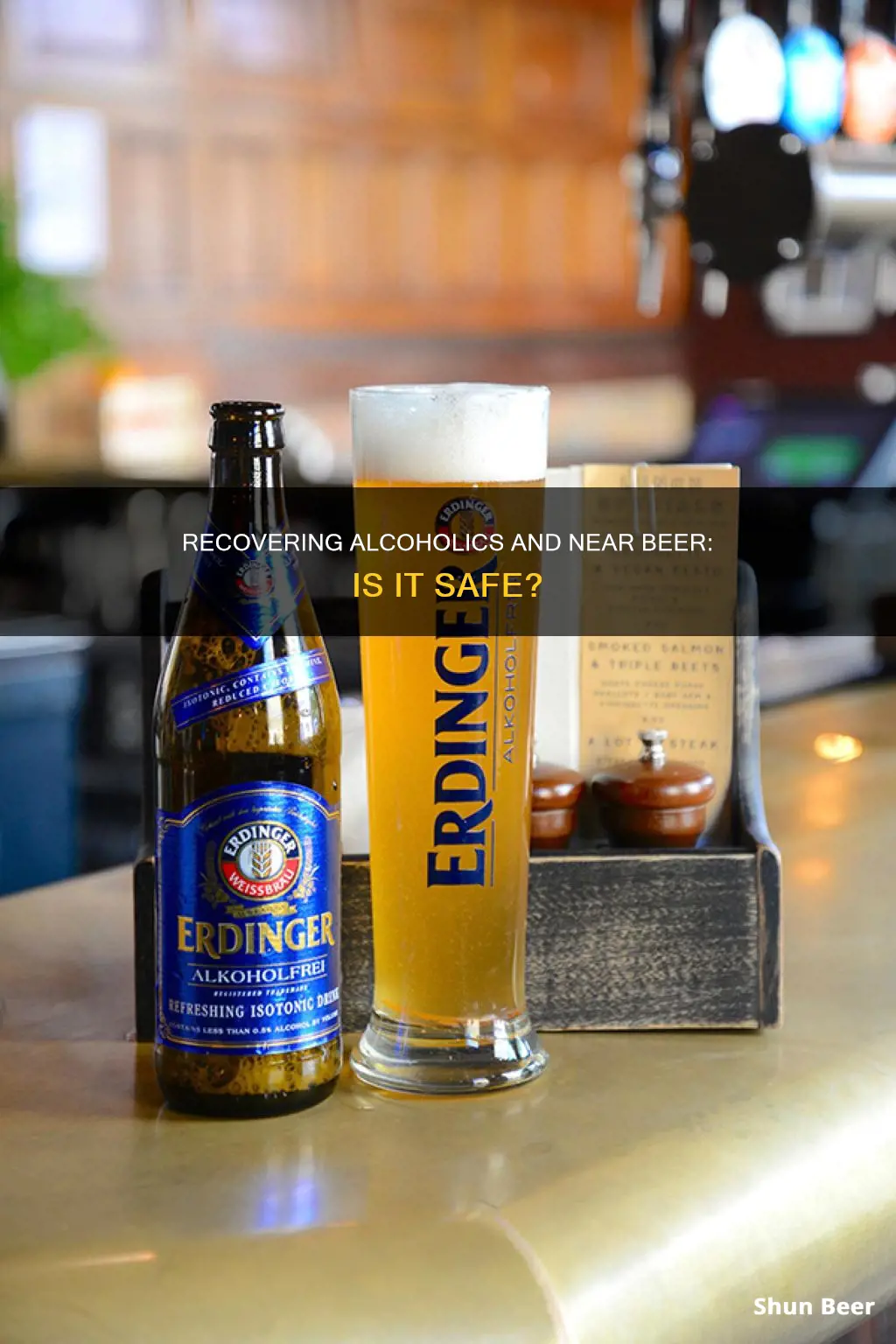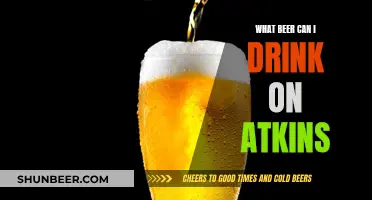
Whether or not a recovering alcoholic can consume non-alcoholic or near beer is a highly debated topic, with strong arguments on both sides. On the one hand, non-alcoholic beer can be a way for recovering alcoholics to feel included in social events where alcohol is served, reducing feelings of isolation and lowering the risk of peer pressure. Additionally, the amount of alcohol in these beverages is typically negligible, similar to the amount found in some foods like ripe bananas. However, the very concept of near beer can be a trigger for some, as the taste and smell may evoke memories of drinking and lead to a relapse. The act of consuming non-alcoholic beer may also delay the development of healthier coping mechanisms and maintain the behavioural habit of drinking. Ultimately, the decision to consume non-alcoholic beer during recovery is a personal one and should be made in consultation with professionals, as it depends on the individual's recovery journey, triggers, and relationship with alcohol.
| Characteristics | Values |
|---|---|
| Alcohol content | Non-alcoholic beer can contain up to 0.5% alcohol by volume (ABV) in the US |
| Addiction risk | Non-alcoholic beer may trigger cravings and lead to a relapse |
| Social benefits | It can help recovering alcoholics feel included at social events |
| Taste | It may be an option for those who enjoy the taste of beer |
| Health risks | Drinking large amounts of non-alcoholic beer may lead to hyponatremia, a condition where the body's sodium content drops to abnormally low levels |
What You'll Learn
- Non-alcoholic beer may trigger cravings for real beer
- The taste, smell and ritual of drinking may awaken memories associated with past alcohol use
- The brain's heightened sensitivity to alcohol may spark a desire for more
- Consuming non-alcoholic beer may maintain the behavioural habit of drinking
- Drinking non-alcoholic beer may delay the development of healthier coping strategies

Non-alcoholic beer may trigger cravings for real beer
The idea of recovering alcoholics drinking non-alcoholic beer is a highly contested topic within the recovery community. While some believe that non-alcoholic beer can be a helpful tool for those in recovery, others argue that it may trigger cravings and lead to a relapse. Here are some reasons why non-alcoholic beer may trigger cravings for real beer:
Psychological Triggers
The taste, smell, and ritual of drinking non-alcoholic beer can evoke powerful memories associated with past alcohol use. This phenomenon, known as "euphoric recall," can be a significant trigger for recovering alcoholics. The act of drinking non-alcoholic beer may remind them of the "good times" they had while drinking, making them more susceptible to cravings and relapse.
Physical Response
Even a small amount of alcohol in non-alcoholic beer can potentially spark a desire for more. Studies suggest that the brains of individuals with a history of alcohol addiction are more sensitive to alcohol. The minimal amount of alcohol in non-alcoholic beer could trigger a physical response and lead to cravings for real beer.
Maintenance of Drinking Habits
Recovery from alcohol addiction often involves significant lifestyle changes, including breaking the routine and habit of drinking. Consuming non-alcoholic beer may maintain the behavioural habit of drinking, making it challenging for recovering alcoholics to distance themselves from their past drinking habits.
Delay in Developing New Coping Mechanisms
Instead of finding new and constructive ways to deal with stress or uncomfortable emotions, a recovering alcoholic who consumes non-alcoholic beer may lean on this familiar, albeit non-alcoholic, crutch. This can delay the development of healthier coping strategies and make them more vulnerable to cravings and relapse.
Misinterpretation of Tolerance
Consuming non-alcoholic beer may lead to a false sense of security and control over one's addiction. Recovering alcoholics may misinterpret their ability to drink non-alcoholic beer as a sign of progress or tolerance, when in reality, it could be paving the way for a potential relapse.
While the decision to consume non-alcoholic beer ultimately rests with the individual, it is crucial to weigh the risks and consider personal triggers and recovery progress. It is generally recommended that those in recovery from alcohol addiction exercise caution and consult with professionals and addiction specialists before making any decisions.
The Magic Behind Beer Machines: A Brewing Revolution
You may want to see also

The taste, smell and ritual of drinking may awaken memories associated with past alcohol use
The taste, smell, and ritual of drinking non-alcoholic beverages can be powerful triggers for recovering alcoholics. While these drinks are often marketed as a healthier alternative to alcohol, they can awaken memories and cravings associated with past alcohol consumption.
The sense of taste is deeply connected to memory. The unique flavours of non-alcoholic beer can evoke recollections of the real thing and the experiences associated with drinking. The ritual of popping open a cold beer, the fizz of the bubbles, and the familiar taste can be a powerful trigger for those in recovery. Even the smallest amount of alcohol can activate the brain's reward system, leading to a craving for more.
The smell of non-alcoholic beer, with its familiar malt and hop aromas, can also be a potent trigger. Smell is strongly linked to memory and emotion, and the aroma of beer can instantly transport a person back to their drinking days. This sense stimulation can evoke positive memories and emotions associated with alcohol consumption, making it challenging for recovering alcoholics to maintain their sobriety.
The act of drinking itself can be ritualistic, from the pop of a bottle to the clink of glasses. These rituals can be deeply ingrained, especially for those who struggled with alcoholism. The act of drinking a non-alcoholic beer can trigger muscle memory and bring back memories of the drinking ritual, increasing the risk of relapse. The ritual of drinking with friends, the sound of ice clinking in a glass, and the smell of a bar can be powerful triggers that awaken memories and make it difficult for recovering alcoholics to resist the urge to drink.
For some, the taste, smell, and ritual of drinking non-alcoholic beer may provide a sense of comfort and familiarity. It can be a way to feel included in social situations without actually consuming alcohol. However, for others, it may be a dangerous trigger that leads them down a slippery slope back to active addiction. The key lies in understanding one's triggers and making informed decisions about consuming non-alcoholic beverages during recovery.
Ultimately, the decision to consume non-alcoholic drinks during recovery is a personal one. It is essential for individuals to be aware of their triggers and make choices that support their sobriety. While non-alcoholic drinks can provide a sense of inclusion and normalcy, they can also awaken memories and cravings associated with past alcohol use, making the journey to recovery more challenging.
German Beer and Gluten Sensitivity: What's the Verdict?
You may want to see also

The brain's heightened sensitivity to alcohol may spark a desire for more
The ritual around drinking can be just as addictive as the alcohol itself. The taste, smell, and ritual of drinking can awaken memories associated with past alcohol use, triggering cravings and leading to a potential relapse. This is known as "euphoric recall", where the brain recalls the positive aspects of drinking while failing to acknowledge the negative consequences.
Additionally, consuming non-alcoholic beer may maintain the behavioural habit of drinking. Recovery often involves making significant lifestyle changes, including breaking the routine of drinking. By continuing to drink non-alcoholic beer, individuals may be delaying the development of healthier coping strategies. Instead of finding new ways to deal with stress or uncomfortable emotions, they may rely on the familiar, albeit non-alcoholic, crutch.
Furthermore, drinking non-alcoholic beer may lead to a false sense of security or control over one's addiction. This misinterpretation of tolerance can pave the way for a relapse. It is crucial for recovering alcoholics to understand their triggers and avoid high-risk situations. While non-alcoholic beer may seem like a harmless alternative, it can potentially be a trigger and lead to more dangerous behaviours.
The decision to consume non-alcoholic beer during recovery is a personal one and should be made in consultation with professionals and addiction specialists. It is essential to weigh the risks and benefits and make an informed choice. While it may be physically possible to drink non-alcoholic beer without breaking sobriety, the more important question is whether it is advisable or beneficial to one's recovery journey.
Beer and Diabetes: What Type 2 Patients Need to Know
You may want to see also

Consuming non-alcoholic beer may maintain the behavioural habit of drinking
For those recovering from alcohol addiction, drinking non-alcoholic beer may be a way to continue participating in social activities without actually consuming alcohol. However, it is important to consider the potential risks associated with non-alcoholic drinks. Consuming non-alcoholic beer may maintain the behavioural habit of drinking for recovering alcoholics.
Firstly, it is crucial to understand that non-alcoholic beers are not completely alcohol-free. In the United States, these beverages can contain up to 0.5% alcohol by volume (ABV) and still be labelled as non-alcoholic. While this amount of alcohol is negligible and unlikely to cause intoxication, it is important to recognise that it is still present.
The bigger risk associated with non-alcoholic beer is its potential to trigger a relapse. The taste and appearance of "near beer" can psychologically trigger a person who misses the act of drinking. It can evoke euphoric recall, bringing back memories of the good times associated with drinking. This could lead to a slippery slope where individuals may start consuming beverages with higher alcohol content, ultimately jeopardising their recovery.
Additionally, the ritual and routine associated with drinking can be just as addictive as the alcohol itself. The act of drinking, the smell, and the context in which it is consumed can trigger cravings and lead to a relapse. For individuals who have struggled with alcohol addiction, it is crucial to be cautious and consult with a healthcare provider or addiction specialist before considering non-alcoholic beer.
The decision to consume non-alcoholic beer during recovery is a personal one. While some individuals may feel comfortable drinking it without triggering a relapse, others may find it too risky. It is essential to know your triggers and stay away from them. If you feel that drinking non-alcoholic beer may lead to cravings or jeopardise your recovery, it is best to avoid it altogether.
To summarise, consuming non-alcoholic beer may maintain the behavioural habit of drinking for recovering alcoholics by triggering cravings, evoking euphoric recall, and potentially leading to a relapse. While it can be a way to feel included in social situations, it is important to carefully consider the risks and make an informed decision based on individual circumstances.
Accutane and Alcohol: Is Beer Safe?
You may want to see also

Drinking non-alcoholic beer may delay the development of healthier coping strategies
While non-alcoholic beer may be a good option for people who want to reduce their alcohol consumption, it may not be the best choice for those in recovery from alcoholism. Although non-alcoholic drinks can help recovering alcoholics feel included in social events and connect with friends, they can also be a trigger for relapse. The taste and appearance of non-alcoholic beer can evoke euphoric recall, reminding the recovering alcoholic of the good times of drinking and triggering a relapse. This is especially true if the person misses the taste of alcohol or the act of binge drinking.
Drinking non-alcoholic beer may also delay the development of healthier coping strategies. Coping strategies are an important aspect of recovery, as they help individuals manage stress and negative emotions without relying on alcohol. By providing a seemingly harmless alternative to alcohol, non-alcoholic beer may hinder the development of these strategies. It may give recovering alcoholics a false sense of security, leading them to believe that they can control their drinking and avoid the negative consequences. However, this sense of control can be easily lost, and the person may find themselves slipping back into old drinking habits.
Additionally, non-alcoholic beer often contains trace amounts of alcohol, which can be a problem for people in recovery. While a small amount of alcohol may not seem like a big deal, it can be a trigger for some individuals. The ritual around drinking can be just as addictive as the alcohol itself, and even a small amount can lead to cravings and a loss of control. Therefore, it is crucial for recovering alcoholics to be aware of their triggers and make informed decisions about consuming non-alcoholic drinks.
Famvir and Beer: Is It Safe to Drink?
You may want to see also
Frequently asked questions
Technically, yes. In the US, non-alcoholic beer can contain up to 0.5% alcohol by volume (ABV). However, this is a highly personal decision that depends on the individual's recovery journey, triggers, and relationship with alcohol.
Drinking non-alcoholic beer may trigger cravings for real beer or other alcoholic drinks. The taste, smell, and ritual of drinking can evoke memories associated with past alcohol use, leading to a potential relapse. Additionally, it may delay the development of healthier coping mechanisms and create a false sense of security or control over one's addiction.
In certain social situations, drinking non-alcoholic beer may help reduce peer pressure and make the person feel less left out. It can also be a safer alternative to consuming alcoholic drinks.
Instead of non-alcoholic beer, which may be too similar to regular beer, a recovering alcoholic could try alcohol-free drinks that don't smell or taste like beer or other alcoholic drinks they used to consume. Water or soda are also good alternatives at social gatherings.
It is crucial to understand your triggers and stay away from them. Avoid high-risk situations and be mindful of your motivation for consuming non-alcoholic drinks. Joining support groups, developing a relationship with a sponsor, exploring therapy options, and finding enjoyable sober activities can also aid in recovery.







